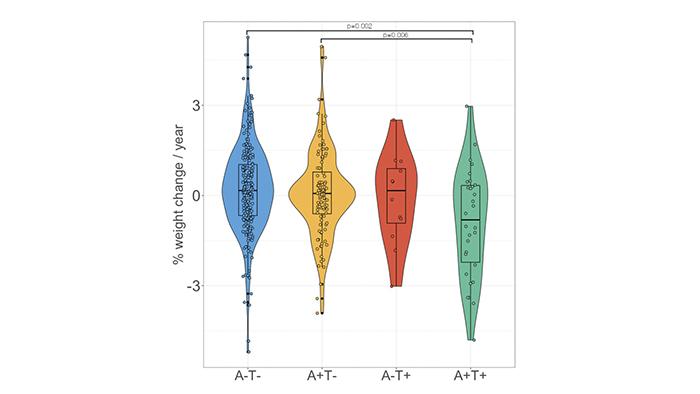16 Jun | 2021
Weight loss may be an indicator of an increased risk of developing Alzheimer's disease

Weight loss may be an indicator of an increased risk of developing Alzheimer's disease
A team from the Pasqual Maragall Foundation research center, the Barcelonaβeta Brain Research Center (BBRC), with the support of the “la Caixa” Foundation, has detected that people at increased risk of developing Alzheimer's disease show weight loss that could predict cognitive impairment of the disease.
"We have found that weight loss can predict the presence of altered biomarkers of Alzheimer's disease, such as the accumulation of Tau and Beta-amyloid proteins in the brain, in people without cognitive impairment," explains Dr. Oriol Grau, first author of the research and researcher at the BBRC. The accumulation of these proteins indicates an increased risk of developing Alzheimer's disease, and begins to be detected up to 20 years before the onset of the first cognitive symptoms. Despite this, having them does not necessarily mean that dementia develops.
The study has been published in the journal Alzheimer's Research & Therapy and has also involved researchers from the Hospital Clínic de Barcelona, Roche Diagnostics International, the University Hospital of Sweden, the Center for Biomedical Research in Fragility and Aging Network Healthy (CIBERFES) and the Biomedical Research Center in the Bioengineering, Biomaterials and Nanomedicine Network (CIBER-BBN).
Gradual weight loss
To conduct the research, the researchers analyzed the association between body weight changes and biomarkers of Alzheimer's disease in 408 participants without cognitive impairment from the Alfa + Study, promoted by the “la Caixa” Foundation. Participants went through different visits separated by an interval of 4 years on average, and performed a series of cognitive, clinical and neuroimaging tests.
The results of the study reveal that participants with a higher risk of Alzheimer's had lost an average of 1% of their body weight per year, while participants with a lower risk, on average, had not experienced weight loss during the follow-up period. These differences were observed taking into account other potential causes of changes in body weight, such as cardiovascular risk factors or levels of anxiety and depression.
Until now, different epidemiological studies had shown that weight loss can occur a decade before the onset of dementia, but its role as a predictor of the presence of biomarkers in the preclinical phase of the disease had been little studied.
“One of the hypotheses that has been developed is that Alzheimer's disease would directly affect a structure of the brain called the hypothalamus; this region, apart from other functions, also regulates the body's metabolism and energy expenditure. Consequently, their alterations could lead to changes in body weight,” explains Dr. Oriol Grau.
Improved identification of people at risk of developing Alzheimer’s
In itself, isolated weight loss is not a useful benchmark for determining the risk of Alzheimer's, as it can lead to many reasons. However, Dr. Grau points out that "incorporating an indicator of body weight changes into risk indices that encompass different measures can help predict which people are most at risk for developing cognitive impairment associated with Alzheimer's disease."
The study opens the door to include this measure, along with other already established risk factors, to have more tools to determine Alzheimer's risk. "Keeping this indicator in mind would allow a closer follow-up in patients with cognitive complaints who also present weight loss, as well as facilitate the identification of people who could benefit from more specific tests or possible prevention strategies," concludes Dr. Grau.










